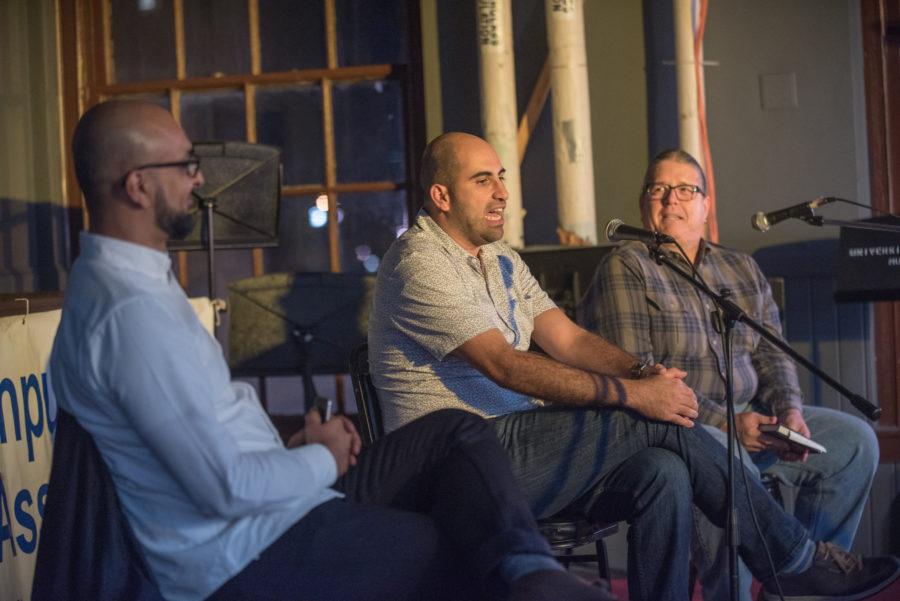Salaita discusses new book, academic freedom
Oct 14, 2015
Last updated on May 5, 2016 at 08:39 p.m.
Robert Warrior interviewed Steven Salaita on Tuesday; similar to their original job interview in 2014. This time, though, the conversation was focused on why Salaita wasn’t hired, not why he should be.
Nearly 200 people were in attendance for Salaita’s book talk at the Independent Media Center, where Salaita was interviewed by Warrior before answering audience questions.
Salaita stopped in Urbana as part of his seven-city book tour to promote “Uncivil Rites: Palestine and the Limits of Academic Freedom,” which he wrote about his tweets and the University’s subsequent decision to revoke his appointment as a tenured professor in the American Indian Studies department.
Former Chancellor Phyllis Wise emailed Salaita on Aug. 1, 2014, informing him she would not forward his appointment at the University onto the Board of Trustees. He was originally hired — according to the American Association of University Professors — as a tenure professor in the American Indian Studies department and slated to begin teaching in fall 2014.
Get The Daily Illini in your inbox!
In her email, Wise cited Salaita’s then-recent Tweets about the conflict in Gaza as reason for not forwarding his appointment. The Tweets were seen by many as anti-Semitic and raised concerns amongst students, faculty, alumni and donors.
Despite protests and statements of concern — including a letter from the AAUP — the Board of Trustees affirmed its decision on Sept. 11, 2014 not to hire Salaita.
Salaita said listening to the live stream of the Board of Trustees meeting where they discussed Salaita’s appointment was tougher than receiving Wise’s email.
“I wanted to think of myself tough enough to listen to it and come out on the other end alright,” he said. “But I wasn’t alright. I was in tears, I had profound anxiety, I had this horrible pit in my stomach for the next two or three days.”
Salaita described feeling like he was treated as an issue rather than a human being.
However, he said, “the high point is right now;” noting the situation has changed dramatically in the almost year and a half since the position was revoked.
“I do feel comfortable saying we won, and I don’t say that because of the administrative turnover. I don’t say that lightly,” Salaita said. “But I say that in relationship to the fact that so many people on and off this campus came together.”
Despite his controversy with the University, Salaita still holds the University as a “world class institution.”
Salaita said the notoriety of his case has harmed his search for another job more than it has helped. He said many people know his name but it carries a negative connotation.
Salaita sued the University in Champaign County Circuit Court in November 2014 for failure to comply with the Freedom of Information Act. The University did not turn over communications between administrators regarding Salaita and his hiring because the request was “unduly burdensome.”
Salaita also filed suit against the University on Jan. 29 — this time in the Northern District of Illinois Federal Court — for violating his academic freedom and for intentional infliction of emotional distress. Phyllis Wise, members of the Board of Trustees and unnamed donors. The case is still in litigation; Salaita is seeking monetary compensation and the position for which he was originally hired.
Meanwhile, the Academic Senate’s Committee on Academic Freedom and Tenure, CAFT, and the AAUP began separate investigations into Salaita’s hiring and the University’s decision. On Dec. 23, 2014, CAFT released a report suggesting the University reconsider its decision not to hire Salaita.
On April 27, the AAUP reported it found Salaita’s rights had been violated, stating the climate of academic freedom was “at best uncertain.”
Following the release of the report, the AAUP voted to censure the University at it’s national conference on June 13. The AAUP will not discuss lifting the censure until its next national conference in June 2016.
Salaita was introduced by Harriet Murav, professor in slavic studies, who called on the University administrators to erase the “toxic racism” on campus.
“One thing I’ve said to Phyllis (Wise) a number of times is we don’t share the same values,” said Warrior, who later alluded to her released emails, “And read those emails from some of our colleagues. It just looks so lonely.”
The discussion was followed by a question and answer session in which members of the audience asked Salaita about his experience, decisions and thoughts about current issues.
Correction: A previous version of this article incorrectly implied that Salaita and Warrior did not meet until 2014. The two actually met when Warrior served as a member of Salaita’s dissertation team at the University of Oklahoma.
Clarification: A previous version of this article stated Salaita was officially hired as a professor. This status should have been attributed to the AAUP’s report on Salaita’s case with the University.
The Daily Illini regrets the errors.






